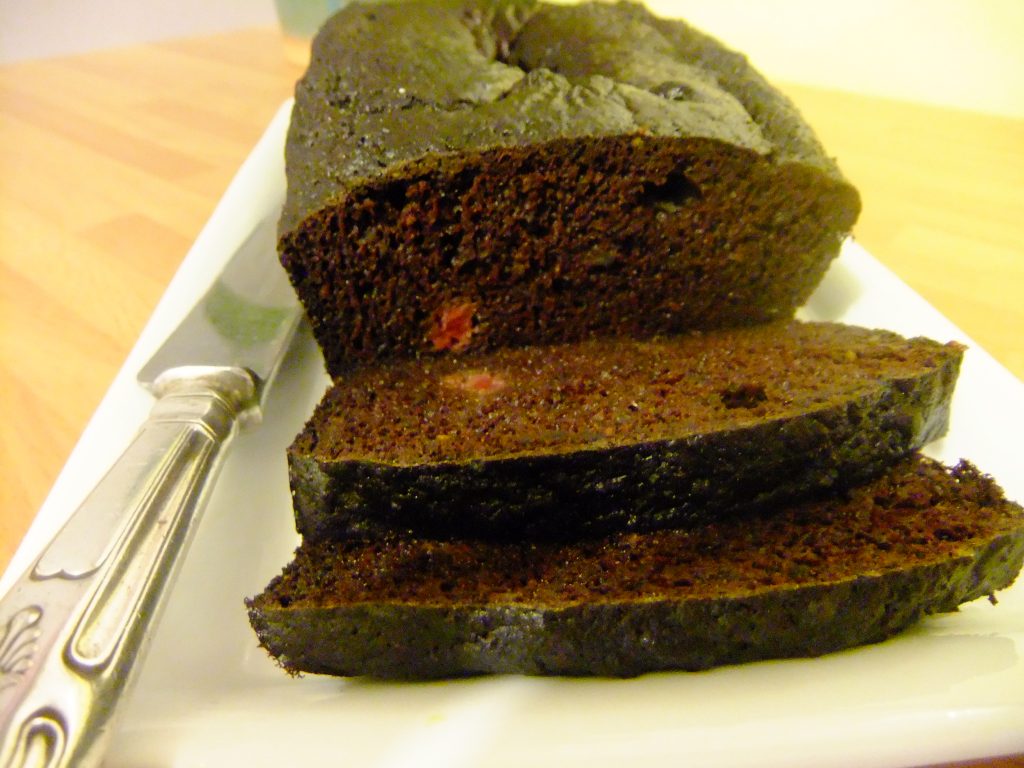This is a chocolate cake that I’d call a crowd-pleaser. It’s really easy and even healthy enough to eat for breakfast. It disappeared within half an hour yesterday when I brought it in to clinic for the other practitioners. It’s really moist and rich though it contains no oil or butter. Unless you know, you could never tell it was made using beans. If you can, use organic ingredients, especially the eggs and the orange zest. I adapted this from the original recipe on atastylovestory.com. The cooled cake stays really moist for at least 2 days if you store it in an airtight container.
1 heaped plus 1 level tbs cocoa powder
1 heaped plus 1 level tbs brown or white rice flour, organic if possible
1 rounded tsp aluminium-free baking powder*
1 x 400g tin of black beans, rinsed and drained (or soak 180g beans overnight then boil till very soft, cool before using)
3 large eggs
150g erythritol or xylitol (use 100g if you like your cakes only slightly sweet)
1 espresso shot (25-30ml) strong dandelion coffee or coffee
½ tsp vanilla extract
Juice and zest from ½ a medium sized (organic if possible) orange
A pinch of Himalayan or Atlantic sea salt
50g fresh or thawed frozen raspberries or dark chocolate (70% cocoa) chopped into pieces about the size of raisins
1 small loaf tin
Silicon or greaseproof paper
A little oil for greasing the tin
1. Preheat oven to 180C (165C fan oven). Grease and line the base of the loaf tin with a rectangle of paper.
2. Sieve the rice flour, cocoa and baking soda together into a bowl.
3. Blend all the ingredients except the chocolate in a food processor or blender (put liquid ingredients in first, then add beans gradually to help everything go round) until the mixture is smooth. The mixture will seem really runny.
4. Pour batter into a greased, parchment-lined loaf tin. Spread raspberries or chocolate pieces across the surface pressing in with a teaspoon.
5. Bake for about 30-35 minutes. It’s done when the point of a knife or cooking needle comes out clean when you stick it into the middle of the cake. Set aside to cool completely before removing it from the tin.
Note: If you decide to make 2 loaves together this will increase the baking time to around 50 minutes.
*Aluminium in baking powder or bread soda is often listed as “flow agent” or “anti-caking agent”
Why this recipe is better for you
The beans in this recipe contain soluble fibre which is a valuable food source for the friendly gut bacteria you need for healthy immunity. Healthy immunity means great defences against pathogens AND not having autoimmune/inflammatory conditions like psoriasis, eczema, hypothyroidism, Crohns or arthritis.
This cake is protein-rich and grain-free, which means it will keep you fuller for longer and not cause spikes in blood sugar (and energy) in the way that “normal” cakes do. It’s low GI, meaning it doesn’t load you up with sugar and deplete essential vitamins and minerals. This is important if you want a tip top immune system and to keep your stress levels low. Xylitol is a healthier alternative to sugar and can safely be used by people with diabetes.
Dandelion coffee is literally the dried, roasted roots of the dandelion plant. It helps support your liver and gallbladder function to help digestion and even your skin. Buy pre-ground dandelion coffee from www.intelligenttea.ie or from health stores dandelion coffee to grind at home. Do avoid “instant” dandelion coffee products they are packed with immune-sabotaging sugars like lactose or dextrose.
Aluminium is an additive in most baking powder and a lot of bread sodas – its used to prevent clumping. Unfortunately aluminium is a “heavy metal” which means it interferes with the body’s ability to utilise nutrients. This can result in a range of issues such as digestive difficulties or low mood.
Using an organic orange and organic eggs means you get less exposure to pesticides. Pesticides are concentrated on the skins or peels or fruit and also in fatty parts of animal produce (eg. egg yolks). Non-organic hens housed in cramped conditions are routinely dusted with pesticides as they are prone to ticks and mites. These chemicals are absorbed through the skin and by inhaling and a certain amount ends up in the eggs. Pesticides are drawn to the fat rich tissues of the body such as nerves and brain. This may be why (non-organic) farmers and agricultural workers have a higher rate of Parkinson’s and other neurological diseases compared to the normal population.

